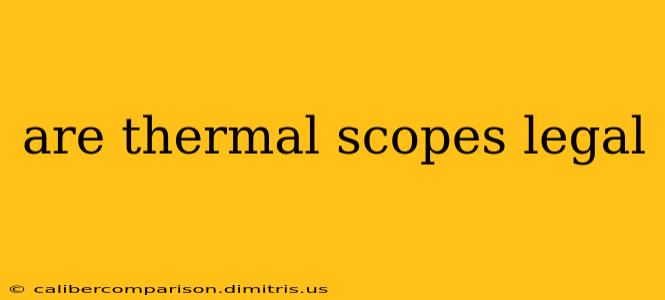Are Thermal Scopes Legal? A Comprehensive Guide to Ownership and Use
The legality of owning and using thermal scopes is a complex issue, varying significantly depending on your location and intended purpose. There's no simple yes or no answer. This guide will break down the key factors determining the legality of thermal scopes, helping you navigate the regulations in your area.
What are Thermal Scopes?
Before diving into legality, let's clarify what thermal scopes are. They are imaging devices that detect infrared radiation emitted by objects, creating images based on temperature differences. This allows users to see in complete darkness or through obscurants like fog and smoke. Their applications range from hunting and wildlife observation to law enforcement and military operations.
Factors Determining Legality:
Several crucial factors influence the legality of thermal scope ownership and use:
1. Jurisdiction: Laws concerning thermal scopes differ significantly between countries, states, and even local jurisdictions. What's legal in one area might be strictly prohibited in another. Always check the specific regulations of your location.
2. Intended Use: The purpose for which you intend to use a thermal scope is paramount. While legal for some applications, they might be illegal for others. Here's a breakdown:
-
Hunting: Many jurisdictions have regulations governing the use of thermal scopes for hunting. Some states permit their use, often with specific restrictions on game species, hunting seasons, and distances. Others have outright bans. It's crucial to thoroughly research your state's hunting regulations before using a thermal scope.
-
Law Enforcement & Military: Law enforcement and military agencies often utilize thermal scopes, but their use is strictly controlled and regulated within their respective organizations. Civilian access to this level of technology is often restricted.
-
Wildlife Observation & Research: Researchers and conservationists may use thermal scopes for studying wildlife, but typically require permits and adhere to strict ethical guidelines.
-
Security & Surveillance: The use of thermal scopes for private security and surveillance may be restricted or require specific permits, particularly in public spaces.
3. Specific Scope Specifications: Some thermal scopes might possess features that are subject to stricter regulations than others. For example, scopes with exceptionally high magnification or specific technological capabilities may fall under tighter controls.
4. Age Restrictions: Similar to firearms, there might be minimum age requirements for purchasing and owning thermal scopes.
How to Determine Legality in Your Area:
To determine the legality of owning and using a thermal scope in your area, follow these steps:
- Consult your local and state laws: Check the relevant legislation, hunting regulations, and any ordinances related to thermal imaging devices.
- Contact your local law enforcement agency: They can provide clarification on the specific regulations in your area.
- Seek legal counsel: If you have any doubts or require specific legal advice, consult a lawyer specializing in firearm or hunting regulations.
Consequences of Illegal Use:
Using a thermal scope illegally can result in various penalties, ranging from fines to confiscation of the device and even criminal charges, depending on the severity of the violation and local laws.
Conclusion:
The legality of thermal scopes is highly dependent on specific circumstances. It’s essential to conduct thorough research, understand your local regulations, and use your best judgment to ensure you're complying with the law. Always prioritize safety and responsible use when considering purchasing or using any thermal imaging device. Ignoring these guidelines could have significant legal consequences.

